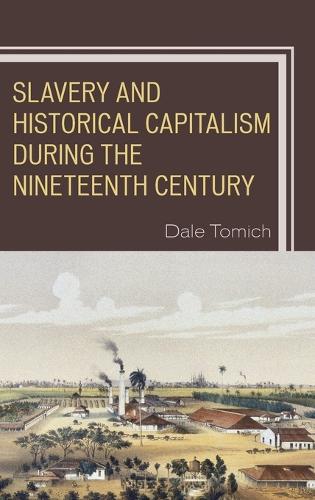
Slavery and Historical Capitalism during the Nineteenth Century
(Hardback)
Publishing Details
Slavery and Historical Capitalism during the Nineteenth Century
By (Author) Dale Tomich
Contributions by Jos Antonio Piqueras
Contributions by Anthony E. Kaye
Contributions by Rafael Marquese
Contributions by Ricardo Salles
Contributions by Dale Tomich
Contributions by Robin Blackburn
Bloomsbury Publishing PLC
Lexington Books
16th October 2017
United States
Classifications
Professional and Scholarly
Non Fiction
History of the Americas
Historiography
303.362
Physical Properties
Hardback
216
Width 158mm, Height 239mm, Spine 21mm
490g
Description
This book examines the historiography of nineteenth century slavery from the perspective of the second slavery. The concept of the second slavery emphasizes the relationship between local histories and world-economic transformations. It breaks with conventional narratives of slavery by emphasizing the expansion of reconfigured slaveries in extensive new zones of commodity production in Brazil, Cuba and the US South as part of world-economic processes of decolonization, industrialization, urbanization, and the creation of mass markets. Thus, slavery was not a moribund institution. Capitalist modernity, liberal ideology, and anti-slavery from above or from below, faced a vigorous foe that operated within the very economic, political, and cultural premises of the changing 19th century world. This perspective offers an original approach to the history of slavery. It has opened up vigorous debates over slavery and anti-slavery, Atlantic history and capitalism. An international group of scholars critically engage older traditions of scholarship on Atlantic history, the economic history of slavery, and the history of slavery in Cuba, Brazil, and the United States from the perspective of the second slavery. Each chapter reinterprets its subject matter in a way that opens out to dialogue between national historiographies and to a reformulation of Atlantic and world-economic history. This collection of essays contributes to the development of a more productive conceptual framework for the reconstruction and reinterpretation of the historical relation of slavery and world capitalism during the nineteenth century.
Reviews
In this groundbreaking collection, Dale Tomich has assembled the most important scholars working on the second slavery to make a powerful statement on the impossibility of treating the nineteenth-century slave economies and societies of the United States, Brazil, and Cuba as separate from the development of historical capitalism. This book is a timely and much-needed work, compelling in its reconsideration of the different national historiographies on the three main regions of nineteenth-century Atlantic slavery, and is also highly innovative in its reinterpretation of nineteenth-century slaverys tight link to historical capitalism. It is the best available study on the history and historiography of the second slavery as a conceptual framework and as an economic, social, and labor system grounded in the production of specific commodities for the capitalist world-economy. -- Enrico Dal Lago, National University of Ireland, Galway
Original in conception and rigorous in execution, this thought-provoking book places current debates on the history of capitalism and slavery within a broad hemispheric perspective, where they always have belonged. -- Christopher Brown, Columbia University
In the Americas, the nineteenth century heralded wars of colonial liberation, the abolition of slavery, and the creation of liberal constitutional regimes that transformed subjects to citizens. Yet, a dark historical fact has long dragged down this celebratory narrative. In 1860 there were more humans enslaved in the Americas than at any other time in historyand four more million than in 1800. Rather than narrating the inevitable story of emancipation over the course of the nineteenth century, Dale Tomich has gathered the leading historians of slaveryRobin Blackburn, Anthony Kaye, Jos Antonio Piqueras, Rafael Marquese, and Ricardo Sallesto explain in nuanced detail how a new form of slavery emergeda Second Slaveryin the United States, Brazil, and Cuba. Standing in contrast to the First Slavery that accompanied colonial regimes governed by European monarchs, the authors analyze how the nineteenth century witnessed an expansion of technological advancements in the service of the production of cotton in the United States, sugar in Cuba, and coffee in Brazil. In short, these authors explain from empirical and theoretical perspectives how capitalism did not eclipse slavery. Rather, capitalism breathed new life into slavery and extended its profitability, productivity, and political longevity by transforming itself into a modern institution at the vanguard of globalization. -- Matt D. Childs, University of South Carolina
Author Bio
Dale Tomich is professor of sociology and deputy director of the Fernand Braudel Center at Binghamton University.
